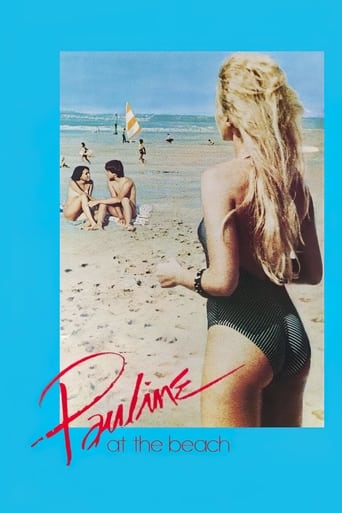SnoopyStyle
Fifteen year old Pauline is spending her summer vacation at the coast with her older cousin Marion. Marion is sexy and getting a divorce. They run into Marion's old friend surfer Pierre who introduces them to divorced father Henri. Pierre is desperate to get together with Marion but she rejects him for Henri. Pauline and young surfer Sylvain get together.Amanda Langlet who plays Pauline actually looks to be 15. She's walking around in a skimpy bikini and trying to understand the stumbling sexual connections of the adults. There is one scene where Pierre gropes sleeping Pauline that plays more and more disturbing. My biggest problem is the static staging where the characters are frozen discussing whatever. It needs more movement in various scenes. Langlet has a steady presence although it would be great to have more explosive energy. The adults are lost which is disconcerning and Pauline is more adult than them.
riju9285
Rohmer's version of the intricacies of love,life and adulthood,in general,makes for a great introduction to the French New Wave in one's late teens,probably. People and specific faces have always been Rohmer's staple issues and yet every time he does it with such a great deal of novelty. A love story 'between' 4,strike that,5 people(the candy girl is no less a part of the ensemble than Pauline herself) is not easy to conceive and much less, execute on camera. The excess in dialogue is perhaps the most un-Rohmeresque aspect of this number. A couple of performances perhaps were a bit out of tune with the rest of the cast's inputs. Sylvain,perhaps could have been better played by La Brosse. But the film,to my mind,is certainly not the best to have emerged from the Eric Rohmer factory.
LeRoyMarko
Pure Rohmer essay on love and relationships. What I find very interesting about Rohmer's film is that you can always think back and apply some aspect of the story to your own life. Difficult break-ups, being in love with someone who doesn't love you or worst, who loves someone you consider an idiot. Just like Pierre is having difficulty explaining that it's not jealousy if he doesn't want Marion to get hurt by getting involved with Henri. Love, when you think of it, is one of the most difficult thing to explain. Actually, can you explain it? Sometimes, the obvious for one is not the obvious for another. And the "naïveté amoureuse" of the other can make someone go crazy.The dialogs in this movie - and there's quite a few - are intelligent, well thought by the director. Some themes that I noted: in love, you share everything, even the suffering; perfection is oppressing; love is a type of illness. Each sentence of the script can practically be dissected.A final word: I liked the performance given by Arielle Dombasle. She reminds me of Pascale Ogier in another great Rohmers film, "Les Nuits de la pleine lune", that came out one year later.80/100 (***)Seen at home, in Toronto, on November 14th, 2004.
stryker-5
The summer is dying as Marion and her young cousin Pauline arrive at a Normandy coastal resort for a short vacation. They meet up with Pierre, an old friend, and Henri, an older man with whom Marion becomes involved.A charming little essay on love and desire, this film could be called slow and slight - no matter, it follows its own internal purpose. These unexceptional people talk, lie, argue and make love in a natural and convincing way.Pauline (Amanda Langlet) is a witty 15-year-old who blossoms in the course of the story. We first see her wearing a sailor suit, looking child-like and presexual. She watches the antics of the adults with detached contempt, then meets Sylvain (Simon de la Brosse), a teenage beach bum with whom she becomes intimate. Pauline rises above the jealousies and posturings of the grown-ups and in a subtle way becomes the dominant figure in this ramshackle little group of vacationers.Rohmer wrote and directed this little comedy of love, and his chief satirical target is Marion (Arielle Dombasle). On the rebound from a foolish marriage, Marion enjoys posing as the worldly-wise older cousin, and she patronises Pauline abominably. It does not take long for Marion to betray herself as a phoney who talks in grandiloquent terms of love and the inner self, but who plays petty courtship games in a social circle of no consequence. "Je veux bruler d'amour", says this pompous prick teaser.It is clear as soon as Marion meets Henri (Feodor Atkine) that she has the hots for him. Her former amour Pierre (Pascal Greggory) is ever after playing catch-up as the mating-dance between Marion and Henri intensifies.The fulcrum of the film is the frolic in the sea involving the free-spirited Henri and the sweet-seller Rosette, who are joined by Sylvain. The latter is at a loose end because Marion and Pauline have gone on a day trip to Mont St-Michel, so he splashes in the sea with the older couple. To avert Marion's jealousy, Henri says that it was Sylvain who was trying to bed Rosette, not he - which leads to a major squabble.Plot is unimportant in this delicate reflection on love and sexual desire. The film is an attractive ensemble piece whose characters linger in the mind long after action movies have been forgotten. Extensive passages of dialogue, endless ruminations on personal relationships and nuances of behaviour are the fabric of this edifice.Verdict - very intelligent, very pretentious, very flirtatious, very longwinded, yet very appealing. Very French.




